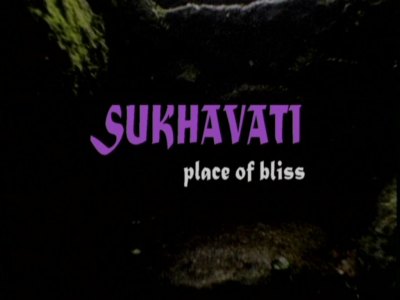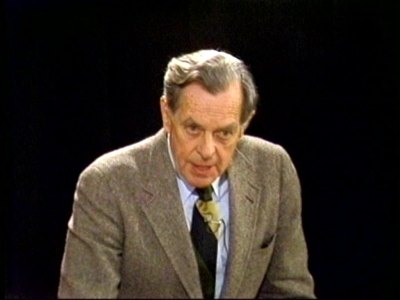| Reviews & Columns |
|
Reviews DVD TV on DVD Blu-ray 4K UHD International DVDs In Theaters Reviews by Studio Video Games Features Collector Series DVDs Easter Egg Database Interviews DVD Talk Radio Feature Articles Columns Anime Talk DVD Savant Horror DVDs The M.O.D. Squad Art House HD Talk Silent DVD
|
DVD Talk Forum |
|
|
| Resources |
|
DVD Price Search Customer Service #'s RCE Info Links |
|
Columns
|
|
|
Joseph Campbell - Sukhavati: A Mythic Journey
Sukhavati: A Mythic Journey is a free-ranging, trippy little documentary that showcases video clips from various lectures by author Joseph Campbell, interspersed with travelogue shots from around the world, as well as artwork and music used to amplify Campbell's ideas. As a head trip, it's pretty interesting, but a serious student of Campbell, or anyone interested in comparative religion studies may want to look elsewhere among Campbell's works for a meaningful discussion.

As I stated in my review of The Hero's Journey: A Biographical Portrait, I'm by no means a scholar of Campbell's work. However, although I disagree with many of his conclusions, his scholarship and dedication to intellectual inquiry is unchallenged, and I find his work intriguing and stimulating. However, Sukhavati: A Mythic Journey isn't nearly as accessible for the average viewer as The Hero's Journey: A Biographical Portrait is, because context is largely lacking here. We dive right into a discussion of Eastern philosophy and religion, through the words of Campbell himself, without any kind of preamble. Subjects then rapidly shift and change, with no linkage, and the uninitiated may feel confused and left out. While it's not in the scope of this review to regurgitate what Campbell has to say about world religions, cultures and their various myths, some of the highlights of his discussions here include, first and foremost, his conclusion that Western, Christian religions are religions of opposition, not harmony, and that we (that is, the West) are unresolved human beings because inherent in our Judeo-Christian religion is a fatal rejection of the universal myths that the rest of the world embraces, and a transfiguring of those myths, in an individualistic rather than collective spirit, that creates conflict with the natural world. Campbell feels that Western society is in free fall, and it is because our religion is no longer a religion of myth, but of ethics, and that we must embrace the sorrows of the world to find our transcendence.
If this sounds confusing to you (or flat out wrong), you won't find much more elucidation in Sukhavati: A Mythic Journey. These are obviously concepts that require not just 78 minutes of thought, but years' worth (or many lifetimes, as many of the Eastern religions would have) to come to some form of understanding. While it would be ridiculous to expect a 78 minute documentary to give a viewer a Master's class in comparative religion, Sukhavati: A Mythic Journey does swing very wide with its jumps from religion to religion, and huge amounts of information are just presented by Campbell, without the slightest bit of context – or, tellingly, without criticism. Instead, we're given the equivalent of those 60's "head trips" that combined art, music and words to blow your mind.
Perhaps that's the point of the documentary. Certainly, the emphasis on presenting various works of art, along with shots of places all over the world, all set to heady indigenous music, varies the monotony that would set in if we only watched filmed versions of Campbell's lectures (I suspect he played better in person than just watching him on camera). But ultimately, what I found troubling about Sukhavati: A Mythic Journey was an element of Campbell's personal outlook that was revealed only at the very end of the film. Again, just to be clear, I don't agree with many of Campbell's assertions, chief among them that we must passively embrace the free fall of Man, and seek not life's pleasures and pains, but only revel in our "belonging" to life's infinite mysteries. First of all, I find it somewhat disingenuous for Campbell to espouse these beliefs of "rejection of earthly pleasures" when he made quite a bit of "earthly pleasures" (i.e.: money) from his instruction that others should abandon the so-called Western rat race. But there are hypocrisies in all of our belief systems and in the way we live our lives, so that's neither here nor there. What does trouble me is one of the last statements that Campbell makes in the film. After telling an audience that the Western world is doomed (sure it is, if you accept a philosophy that says, "I accept all suffering as a given, and I will embrace it as beautiful"), he states, "I may not be changing the world, but I'm changing people, and that's what's got to be done." And believe me, he says this without a hint of irony. He really believes that's his mission: to change people in the West, who he believes are inherently compromised and faulty by their culture, and by extension (even though he says he dismisses the possibility), change the world. I don't happen to agree that Western civilization is inherently faulty; maybe you do. That's fine. But Campbell's final statement is unfortunate, and makes the author and academic come off more as a zealot, rather than as just one more voice in a messy, chaotic, free Western culture of individuals (of which he was a very succesfull and active participant) who work, love, strive, play and create all rather nicely – all without the necessity of being "changed" by Mr. Campbell.

The DVD:
The Video:
The full frame video image for Sukhavati: A Mythic Journey is not the best: grainy, washed out colors during the filmed segments, and video clips of questionable quality of Campbell in action make for a marginal video presentation.
The Audio:
The Dolby Digital 2.0 mono soundtrack is adequate for this kind of documentary presentation.
The Extras:
There are no extras for Sukhavati: A Mythic Journey
Final Thoughts:
As I said, I find Joseph Campbell's work stimulating and intriguing; I don't agree with much of his conclusions, but his work provides an interesting context for discussion of world religions and cultures (if that's your bag). However, context is exactly what is lacking in Sukhavati: A Mythic Journey, with directors Maxine Harris and Sheldon Rochlin diving right into Campbell's subject matter with little or no grounding for the average viewer. And when the subject matter switches to another field of thought, there's almost no transition. As for Campbell himself, I don't think he was (or will be) a "changer of men," but he's such a compelling, lucid writer and philosopher that Sukhavati: A Mythic Journey, despite its shortcomings, ends up as recommended viewing.
Paul Mavis is an internationally published film and television historian, and the author of The Espionage Filmography
|
| Popular Reviews |
| Sponsored Links |
|
|
| Sponsored Links |
|
|
| Release List | Reviews | Shop | Newsletter | Forum | DVD Giveaways | Blu-Ray | Advertise |
|
Copyright 2024 DVDTalk.com All Rights Reserved. Legal Info, Privacy Policy, Terms of Use,
Manage Preferences,
Your Privacy Choices | |||||||












